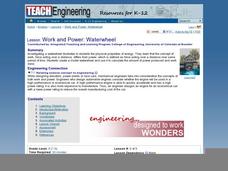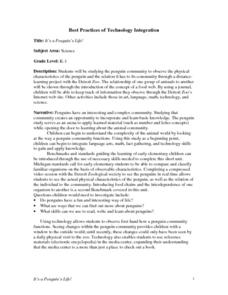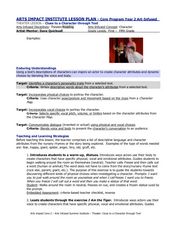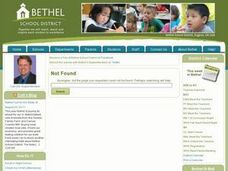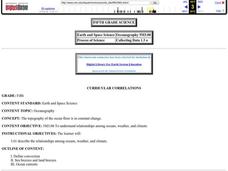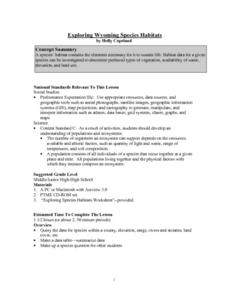Curated OER
Work and Power: Waterwheel
Students investigate a waterwheel and the physical properties of energy. For this waterwheel lesson students create a model waterwheel and calculate the amount of power produced.
Curated OER
It's a Penguin's Life!
Students will be studying the penguin community to observe the physical characteristics of the penguin and the relation it has to its community through a distance learning project with the Detroit Zoo.
Curated OER
Myths and Reality of Old Age
Students use a glossary of terms to learn about mature adults. They examine common stereotypes in aging. They create awareness of language that contributes to age discrimination and stereotyping. They discuss the social, psychological,...
Curated OER
Basic Ideas of Inheritance
Students enter personal information into a database. The information is used to reinforce the ideas of inheritance that is found in 1st Grade Science. Access to technology is essential for this lesson. Adding the use of a mirror for...
Curated OER
Colors of Stars
Students observe the colors found in the flame of a burning candle and examine the basic concepts of matter and energy. Students apply this information to the color's of starts and the temperature of the stars photosphere. Students...
Curated OER
Exploring Hawaiian Mountain Zones
Fourth graders watch a video that describes the climate and vegetation zones of Hawaii. They describe the different physical conditions that create vegetation zones from the sea to the mountains. In groups, they create an illustrated...
Curated OER
Local Animal Sort
Students examine the concepts of sorting and classifying animal. They use familiar animals to determine the connections between physical characteristics and categorization.
Curated OER
Slides, Flips. Turns......It's All On A Memory Book Page
Fourth graders use tangram sets to investigate the congruence of shapes. They use congruent shapes to demonstrate the properties of slides, flips, and turns. They complete a math journal entry that describes and illustrates each concept.
Curated OER
More Joy of Abstract Nouns 1
Students are provided with a list of 20 adjectives that they must generate abstract nouns to match. For example, the first term, luxurious, would prompt the answer luxury. Directions for this activity explain that abstract nouns don't...
Curated OER
Clues to a Character through Text
Readers will read a text and fill out a character map based on the characters in that text. They will explore different qualities of each character for their map. this can be modified to support younger learners. They will learn about...
Curated OER
Equivalent Fractions
Introduce elementary students, grades 3-5 to the concept of equivalent fractions. Each student folds a paper in half and color one of the equal parts of the paper. They use this paper to define numerator, denominator and the idea that a...
Curated OER
Mapping the Lewis and Clark Trail
Students explore how physical and human geography features effected Lewis and Clark's expedition by using the Lewis and Clark Digital Discovery Web site.
Curated OER
What's a Capacitor?
Students explain concepts of charge storage, how a capacitor works and how DRAM uses capacitors to store memory. They construct a capacitor and use a multimeter with capacitance meter capability to measure the stored charge in the...
Curated OER
Curricular Correlations
Here is a terrific way to teach your oceanographers about the effects that the ocean have on the weather and climate found throughout the world. In it, pupils engage in a science experiment designed to emulate how the ocean affects...
Curated OER
Exploring Wyoming Species Habitats
Students are introduced to the concept of species habitats and ranges. They introduced to ArcView GIS as a tool for mapping. Pupils use query data for species withina county, elevation, range, rivers and streams, land cover, and etc....
Curated OER
Pedal Power
Employ proportional reasoning and algebraic understanding to a determine a real world math quandary. Intel has created a project based unit to engage learners in using algebra to describe the physical world. They will create equations,...
Curated OER
A Simple Motor
Instructions for building a simple electromagnetic motor are provided for the teacher. Aside from some sketchy background information and a list of content standards to be met, that is about all you will find in this resource. The motor...
Curated OER
Galileo's Thermometer: Measuring the Density of Various Unknown Liquids
Sprouting scientists explore the concept of density by making mass and volume measurements for five different liquids. From these measurements, they calculate densities. They apply their learning to explain Galileo's thermometer works...
Curated OER
Geography: Puerto Rico
Take a trip to Puerto Rico! Learners engage in a web quest, identify Puerto Rico on the map, and gather information related to physical features and cultural factors. Their efforts culminate when they design a brochure comparing the...
Curated OER
A Good Foundation
Students examine how regional geology affects bridge foundations. In this physical science lesson, students explore how bridge types are constructed for different purposes.
Curated OER
Where Are the Dinosaurs?
Students explore the concept of extinction by studying dinosaurs. In this extinction lesson, students watch dinosaur video clips or complete a puppet finger play about dinosaurs. Students may then complete a dinosaur diorama or a...
Curated OER
Map Skills
Do you need to practice map skills? Children with a range of abilities will complete a KWL chart about maps, practice important map vocabulary and then read a few pages from their textbook. They will use their vocabulary words and...
Curated OER
Title: Rivers as Borders
Students are introduced to the concept of borders. They read maps and identify rivers that separate different countries and states. They examine how or why a landform such as a river border might be the reason for different cultures.
Curated OER
Where is ? ? ? ?
Students explain and explain the concept of a grid system. They define absolute and relative location and develop an imaginary city on graph paper using a grid system.
Other popular searches
- Physics Concepts Momentum
- Physics Concepts on Pressure
- Physics Concepts Motion
- Physics Concepts Force
- Physics Concepts Light
- Physics Concepts 24
- Different Physics Concepts
- Physics Concepts Flight


